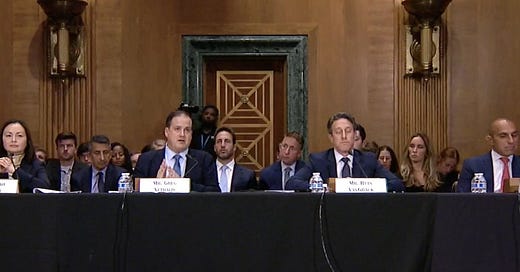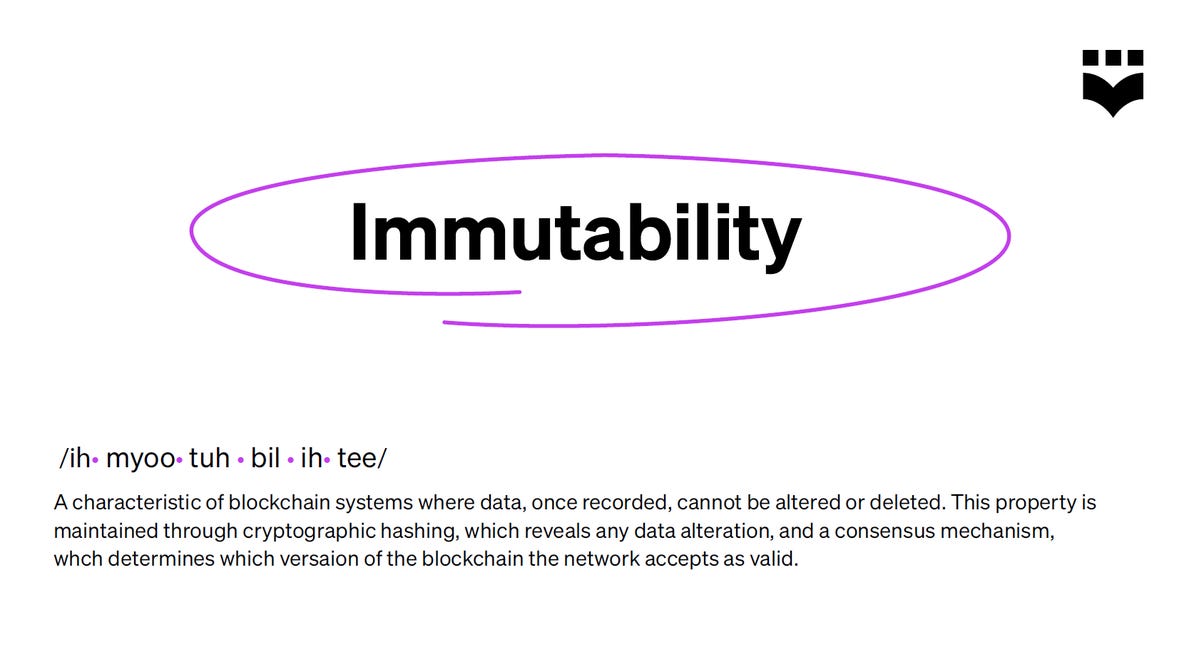The DeFi Debrief
Week of June 30, 2025: Senate Banking on Market Structure; Deploying American Blockchains Act; BSA Modernization; DEF Updates
Senate Banking Committee Holds Hearing on Digital Asset Market Structure Legislation
On June 24, 2025, the Senate Banking Committee Digital Assets Subcommittee held a hearing entitled: “Exploring Bipartisan Legislative Frameworks for Digital Asset Market Structure.” DEF was represented by Board Member Greg Xethalis, General Counsel at Multicoin Capital. The other witnesses included Sarah Hammer, Executive Director of the Wharton School; Ryan VanGrack, Vice President of Legal at Coinbase; and the Honorable Rostin Behnam, Former Chairman of the U.S. Commodity Futures Trading Commission. The hearing featured discussion on potential new frameworks to support responsible digital assets innovation, protect consumers, and clarify regulatory jurisdiction for digital asset spot markets. Witnesses addressed the importance of preserving self-custody, tailoring rules for decentralized protocols, and ensuring that U.S. policy remains competitive globally, among other topics.
During his opening remarks, Xethalis touched on the significance of DeFi, stating: “We also need to preserve the mechanisms that enable permissionless innovation. Self-custody and decentralized finance, or DeFi, are not edge use cases; they are how every new token and protocol begins. Centralized intermediaries only support an asset or protocol after there’s proven demand, measured by usage, liquidity, and community support. Without DeFi and self-custody, we lose the sandbox that allows innovation to flourish, and without preserving legal space for these tools, we push early-stage projects entirely outside the reach of U.S. regulatory oversight and our country’s commercial norms.”
Senate Banking Committee Leadership Releases Principles for Senate Market Structure Legislation
In advance of the Senate Banking Committee hearing on market structyre, Committee leadership released principles for the Senate’s development of digital asset market structure legislation. The principles state that digital asset market structure legislation: (1) should clearly define the legal status of digital assets, (2) jurisdiction should be clearly allocated among regulators, (3) regulation should be modernized to foster innovation, (4) regulation should protect those who purchase or trade digital assets, (5) illicit finance measures should be targeted and pro-innovation, and (6) federal financial regulators should welcome responsible innovation.
The Senate Banking Committee principles correctly recognize the unique technological characteristics of DeFi stating: “Legislation should not apply principles designed for centralized firms to decentralized protocols,” and “Legislation should recognize the different risks and benefits between centralized firms, decentralized finance protocols, and non-custodial software platforms…For similar reasons, self-custody of digital assets should be explicitly preserved.”
Notably, the principles urge federal financial regulators to welcome responsible innovation by providing safe harbors, the use of no-action guidance, and affirmation that crypto-related activities are permissible for banks when conducted safely — all things that DEF believes will lay the groundwork for a more consistent and innovation-forward regulatory environment.
Later in the week, Senate Banking Committee leadership, including Chairman Tim Scott (R-SC), Senator Lummis (R-WY), and Bo Hines, Executive Director of the President's Council of Advisers for Digital Assets, hosted a fireside chat to discuss the newly released market structure principles and “the legislative pathway forward” for digital assets in the United States. In this conversation, they recognized the significant victory of the passage of the GENIUS Act out of the Senate and the advancement of digital asset market structure legislation.
Senator Lummis and Bo Hines stated a desire to see a Senate-side market structure draft released before the August recess and for it be finalized by the end of September. As a reminder, the House Financial Services and House Agriculture Committee recently advanced proposed versions of digital asset market structure, the Digital Asset Markets Clarity Act, out of both Committees.
Deploying American Blockchains Act Passed Out of the House
On June 23, 2025, the bipartisan Deploying American Blockchains Act of 2025 (H.R. 1664), sponsored by Representatives Kat Cammack (R-FL) and Darren Soto (D-FL), successfully passed out of the House by a voice vote. The legislation designates the Secretary of Commerce as the President's chief advisor on blockchain-related policy, tasked with advancing the United States' leadership in blockchain tech domestically and globally. The House legislation has now been received by the Senate, and awaits Senate consideration.
The proposed bill establishes a new program within the Department of Commerce to coordinate initiatives and promote innovation, adoption, and security of blockchain technologies across various sectors. The bill also mandates the submission of a public report to Congress annually that summarizes activities, assess risks, and recommends legislative actions aimed at advancing American leadership in digital assets and blockchain technology.
Of note, the Senate Commerce Committee held a markup of several pieces of legislation in April of this year, advancing the Senate’s bipartisan version of the Deploying American Blockchains Act out of Committee by voice vote. The legislation, which is co-sponsored by Senators Bernie Moreno (R-OH), Tim Sheehy (R-MT), and Lisa Blunt Rochester (D-DE), is pending Senate action.
Deputy Treasury Secretary Lays Out Guiding Principles for Bank Secrecy Act Modernization
On June 18, 2025, at the 62nd Bank Secrecy Act Advisory Group, an event hosted by the Financial Crimes Enforcement Network (FinCEN), Deputy Secretary of the Treasury Michael Faulkender outlined key principles guiding the Trump Administration's regulatory agenda and Bank Secrecy Act (BSA) modernization efforts.
According to Deputy Secretary Faulkender’s statement, the Department’s BSA framework must derive from clear statutory mandates, be cost-efficient, maintain fairness and consistency, and ensure regulatory efficiency with taxpayer transparency. A risk-based Anti-Money Laundering/Combating Financing of Terrorism (AML/CFT) framework that allows financial institutions to focus resources on high-risk national security threats while de-prioritizing lower-risk activities will be central to this reform approach. Notably, Faulkender’s statement expresses attention on modernizing reporting requirements, such as Suspicious Activity Reports (SARs) and Currency Transaction Reports (CTRs).
The Deputy Secretary stated: "Modernizing the AML/CFT regime not only includes updating rules, streamlining reporting, and improving feedback; it also involves a commitment from the Trump Administration to innovation. I understand that the AML Act required the creation of two specific BSAAG Subcommittees: the Innovation and Technology Subcommittee and the Information Security and Confidentiality Subcommittee. The Administration is committed to promoting responsible financial innovation, including related to the use of digital assets."
Hopefully Deputy Secretary Faulkender’s statement is a positive signal for the digital assets ecosystem. DEF supports modernizing the BSA regime and reprioritizing enforcement to be better aligned with the biggest national security threats.
Also last week, joining a growing coalition of thought leaders and policy experts from across the industry, Katie Haun of Haun Ventures, a former government prosecutor, published an op-ed in the MIT Technology Review entitled, “The Bank Secrecy Act is failing everyone. It’s time to rethink financial surveillance.” The op-ed explains that: “Technological innovations over the past several decades have brought incredible convenience to economic life. Now our privacy standards must catch up. With Congress considering landmark legislation on digital assets, it’s an important moment to consider what kind of financial system we want—not just in terms of efficiency and access, but in terms of freedom.”
For more information on the BSA regime, and why DeFi Education Fund believes that the ineffective regime shouldn’t be applied to noncustodial blockchain technology, read DEF’s policy paper authored by Gavin Zavatone and Henry Michaelson: “The Bank Secrecy Act is Broken: Examining the burdens, costs, and failures of the Bank Secrecy Act (BSA), and the potentially disastrous implications of applying the BSA to decentralized finance (DeFi).”
DeFi Education Fund at Permissionless in NYC
Last week, DEF’s Executive Director & CLO, Amanda Tuminelli, and Board Member, Jake Chervinsky, participated in a panel discussion at Permissionless in NYC. The panel “DeFi and the Future of Policy” featured an in-depth policy discussion on DeFi in Washington as legislation is rapidly progressing. The panel also featured Colin McLaren of Solana Policy Institute and Andrew Murphy from Talos, and was moderated by Lindsay Fraser of Uniswap Labs. For more information on the panel discussion, see DEF Chief Communications Officer Jenn Rosenthal’s X thread.
DEF Blog on Chair Atkins’ Proposed DeFi Innovation Exemption
Last week, DeFi Education Fund published a blog post written by DEF’s Policy Analyst, Gavin Zavatone, on Securities and Exchange Commission Chairman Atkins’ proposed DeFi innovation exemption. At the Crypto Task Force’s recent roundtable on “DeFi and the American Spirit,” the Chairman revealed that he has instructed the Commission’s staff to explore a proposed “innovation exemption” for select onchain financial products. This new blog breaks down the potential implications for DeFi and highlights three critical principles for the exemption.
“An innovation exemption for DeFi technology could protect developers, support the flourishing of DeFi onshore in the United States, and create incentives for greater transparency and decentralization across the industry. It would also establish necessary guardrails to protect users and consumers in DeFi markets, and allow smaller innovators to bring DeFi technology to market without the fear of burdensome and incompatible regulations.”
Read the full blog post here.
DeFi Dictionary - Defining DeFi Weekly
Follow the DeFi Dictionary account on X - where we define one DeFi-related word or phrase each week.
Our word of the week: Immutability. As debates heat up over how to regulate DeFi and crypto, we remember that immutability is important to DeFi, from smart contracts to protocol governance.
Notable and Quotable










